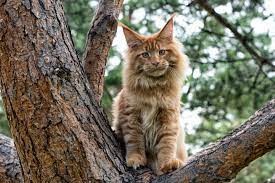the
maine coon cat
Purchase Agreement
All kittens purchased from Highland Maine Coons are healthy, genetically pure Maine Coon, and have a lifetime return policy with cash back once resold. This policy can be utilized for any reason. See-Our Guarantee.
Highland Maine Coon Cats must be contacted by phone at (225) 385-0748 prior to reserving or purchasing a kitten.
All kittens are sold as pets and both parties agree to have them Neutered or Spayed No Earlier than 5 months of age and no later than 6 months of age. Due to this purchaser/breeder Agreement we give no merit to male or female sex.
Kittens will be raised inside only and protected from other cats that may be carriers of diseases such as Feline Leukemia.
Purchaser agrees to never declaw the Maine Coon kitten or cat purchased from Highland Maine Coons.
Declawing
Maine Coon Cats and Maine Coon Kittens are easily trained not to scratch furniture when provided with scratch post and pads. “No” must be established as a defined boundary, but reinforced with “here” which is simply a portable scratch pad made of cardboard and laced with catnip. It is difficult to stop natural behavior, but easy to redirect it with positive reinforcement.
Clawing is a natural behavior. Cats claw to exercise and to maintain the effectiveness of their nails, to develop muscles tone for orthopedic support and health.
Declawing is not like a manicure. It’s a serious surgery that involves amputations, not just of the cats’ nails, but of the last digit of each toe as well. This causes permanent crippling both physically and psycho logically.
logically.
Cats often experience extreme pain when they awaken from the surgery and often have difficulty walking. The ability to climb safely is lost forever. Declawing results in a gradual weakening of the leg, shoulder, and back muscles. Because of impaired balance caused by the procedure, declawed cats have to relearn how to walk, much as a person would after losing his or her toes. After the surgery, the nails can grow back inside the paw, causing extreme pain unknown to the cat’s guardian.
Without claws, Cats are not only permanently crippled, but also lose their coordination and confidence. Litter trained cats might start to urinate and defecate outside the litter box in an attempt to mark their territory. Declawed cats might become fearful of humans, withdrawn, irritable, aggressive, and unpredictable. Declawing is not a solution to any behavior problems of your cat, but will instead, certainly cause them.
Most developed countries—including Germany, England, Australia, and Japan—have prohibited or severely restricted veterinarians from performing the painful, permanently crippling, and mutilating procedure.
Many compassionate and ethical Veterinarians refuse to declaw cats, even in areas where the procedure is legal, because declawing is cruel and of no benefit to cats—and it violates veterinarians’ oath to “do no harm.”
With a little patience and effort, it’s easy and rewarding to train your Siberian cat where to conduct their natural behaviors.

